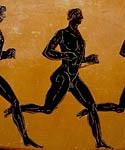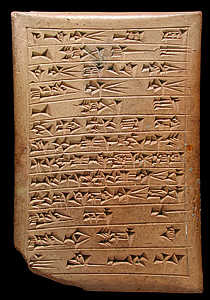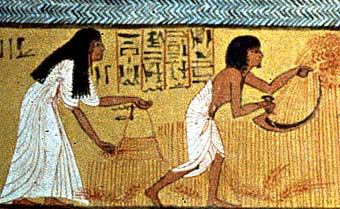I have been writing about learning about history a lot lately. So instead of writing about history I thought I would write about something else that really interests me: travel. I have always been interested in the rest of the world. One of my big goals for college is to study abroad in at least one place. In fact, if a college i'm looking at doesn't have a good study abroad program, I will not consider it. I love to travel, and I love to learn about other cultures. It is one of the reasons I like learning spanish so much. So I began to look for articles on traveling that I could make a blog post on. There are a LOT of articles on traveling. I finally found one that looked interesting to me called "Why We Travel". I didn't really know what to expect when I began reading it; maybe it would be something about loving to see new sights. In reality, it was more about traveling to places not for the tourist attraction, but to look at the essence of how others live. So, in other words, it falls almost exactly in line with my way of thinking. The author mentions traveling to dangerous places. Places that people always tell him not to go to at all. And he says that they have been some of the most fulfilling trips of his life. That when a place is in turmoil, or maybe fallen of the "tourist map", you can really see how its inhabitents live, instead of how they treat their tourists. I'm going to be honest and tell you I have no idea how this will translate into an area I'd like to learn about, but
British history fascinates me. It's so full of drama and intrigue, compared to most history it is almost fun to read about. There is a few series of books that are fictional, and are from the points of view of royal women throughout Britain's history. A famous one you might have heard about is The Other Boleyn Girl. Here is a link to the author's website. So I went to BBC's website to look up some british history. The books I have read have mainly focused on history after the 15th century, but I decided to look at Norman Times (1066-1154). It seems like a time that I'd like to learn about. There was plenty of drama, wars, and invasion. There was also a lot of fighting against family, brother against brother. I actually went to England last summer, and the trip really made learning about British History interesting, since I have actually BEEN to a lot of these places. It really makes the stories, that are already pretty interesting, really come alive. I think I would really like to learn about the different eras of British history. There are a lot of books that I could read for this, if we are going to do a similar project, or I could research from different sites, just like we did for the religion project. I think i would want to learn about a specific era, since I think trying to compare every part of British history would be really hard to do within a certain time frame.
For my final project, I decided to do an essay both comparing Eve to The Red Tent, and discussing the themes that are prevalent in both. I decided to do the essay because I had previously read the book Eve, and when I read The Red Tent, I was very much reminded of it. Eve is a book that is very similar to The Red Tent in that it is also written, fictionally, from the perspective of some biblical women: Eve and her daughters. The way of talking that the characters have is very similar, the things they discuss and how they live are very similar. The books almost sound like they could have been written by the same author. Apparently I am not the only one to make the connection, on the cover of my copy of Eve at home there is a review that references The R I re-read Eve over the weekend, since it has been awhile since I last read it. It's still a good book! It follows Adam and Eve, from Eve's perspective, as they get thrown out of the Garden and try to navigate being the first humans. It talks about Eve's struggles raising a disfunctional family, and also gives you stories from the perspectives of her daughters. There is a twist partway through the book, however, when they actually meet another civilization of people. Their lives are thrown into further turmoil and diffuculty when these people arrive. It's a good book and I reccommend that you read it if that sort of story appeals to you.
This year, the Olympics are going to be in London. Everyone likes watching the Olympics, where the best of the best come to compete. We marvel at their almost superhuman feats, maybe wishing we could be that athletic. The same goes for the ancient Greeks, perhaps on an even larger scale. I read an article about the ancient Olympics and today's Olympics. In ancient Greece, the Olympics were a national pastime. Any winner at the Olympics gained national fame, and was glorified almost to the point of being divine. The ancient Greeks put a lot of emphasis on a man's athleticism. The Olympics we hold every year are very similar to the ones held in ancient Greece, except for the fact that they competed mostly naked. We also, as a nation, glorify our athletes that we send to compete. Look at Michael Phelps; he is now a sort of national symbol for amazing swimming. People today look at these athletes, enjoy watching them compete, and sometimes wish we could be that athletic, just like the people of ancient Greece did. There are differences between today's and ancient Greece's Olympics. In ancient Greece the Olympics had a very religious edge to them. They were held for the glory of the Gods, and the winners were said to be the favorites of the Gods, while the losers were said to have angered them somehow. Another difference was that women were not allowed to compete, sometimes even not allowed to watch. The article did mention that young women, virgins would sometimes be allowed to watch, and that it was even a place they went to find a fit husband.
For this blog post I watched a video about the development of writing. I love to read, so this caught my eye when i was looking for something to write about. After all, without writing, i wouldn't have the stories I love to read. From the video, you can see that writing developed differently and separately in almost every part of the globe. Apparently it was an idea that really appealed to people. Many places, like the Mayans, used pictures to symbolize what they wanted to say. Others, like the ancient Greeks, used symbols to represent different sounds from their language. That seems like the more efficient way of writing to me, and apparently to the ancient peoples too, since it is generally what is used today. I think that writing is something that really sets us apart as a civilized species, and gives us the ability to amass information and pass it on the the next generation, making each generation better off than the one before. It helps us to really put our ideas into a form that others can understand. It helps progress. Where would we be today without the invention of writing. I would say we'd be somewhere living in caves, hunting and gathering. Most likely still in small nomadic groups. Can you imagine trying to organize a city through only the use of word of mouth? As a part of the development of ancient civilizations, (which is what i want to learn about), it really helped them move forward, and create a society that could progress past a simple agricultural settlement.
These are my conclusions after going over the book, and discussing it with my group. The book was a really interesting look into the lives of women during biblical times. I read the actual story from the bible. In the original story, there is almost no mention of women. The story briefly mentions Jacob's LEGAL wives, Rachel and Leah, but does not mention Zilpah or Bilhah. It is completely from the man's point of view, whereas The Red Tent is completely from a women's point of view. In the bible story Dinah is a passing mention; she is barely mentioned as the cause for the fighting and the trouble according to the men. To me this is interesting to think about in terms of other historical accounts. How much are we missing because of the male author's inattention to women? Their part in history was undeniably important, but how much do we have wrong? There's perhaps no way to know the answers to these questions, but that is part of the reason I enjoyed this book so much. It shows us an example of how women may have had a larger part in the course of history than we know about know. It gives us a new perspective on all the old stories. Another author that I really enjoy who gives a new persepctive on women's lives in the past is Philippa Gregory. She mainly writes about the lives of royal women of the past. These books really make me think about how the
If you've been trying to click on the links i've been including and they're not working, here's why: You have to hold down the ctrl button and THEN click the link. Thanks:)
Today I read an article about family life in ancient egypt. I said I wanted to learn about the culture, so I figured I should learn a little about familial relations. The main character of our book, Dinah, actually live in Egypt towards the end of her life. Here is a ( link ) to the article if you'd like to read it for yourself :) . The article contains actual letters from a disgruntled farmer to his sons. He has a favorite son (sound familiar?) and his other sons are quite unhappy about the preferential treatment this son gets. Daughters, if he has any, are not mentioned, which fits with the times. At this point daughters were not as valuable or significant as a son. The letters contain many issues that you see within today's families, even in such a different society. The preferred son is seen everywhere, I see it in my best friend's family clearly. (Just a little tidbit of information: I'm in a Psychology class at the moment also, and in the class we learned about how even if a parent insists they love each child equally, there is one that is especially close to their heart. Most won't show a preference for one child so as not to hurt another child's feelings, but it is there.) The disgruntled reactions of the other children comes through loud and clear, as does the defensiveness of the father. Again, things you see everyday in our society. The father has also taken a new wife, since the mother of his children has died. Something that happens quite often in our society. The sons clearly resent the new wife, and apparently will not show the respect the father feels she deserves. The issues that are causing strife in this family are issues that you can find in almost any society, at the very least in our own. I believe that they come down to basic human traits, that everyone has. This comes back to the question we've been asking since the beginning of the year: Are people more similar, or the more different? Looking at this article, I'd say more similar.
I said that one of the things i wanted to learn about was ancient civilizations, and how their cultures relate to the cultures we have today. So for this blog post I'm going to be talking about ancient Greece. They had a revolutionary democratic system, most notably in Athens. They served as an example and a basis for democratic thought that was refined in later centuries. To learn a little bit about what I'll be discussing, i read an article (link) from bbc that discussed democracy in Athens. Democracy in Athens was not perfect; there was the occasional oligarchy that popped up. However, for it's time it was revolutionary in how it was set up. In Athenian democracy, adult male citizens could vote. As I said, it was not perfect. Most every official was elected by the mass of people, in meetings held several times a year.
So. How Athenian Democracy relates to the democracy we have in the United States today. Athenian democracy was on a smaller scale (obviously). The smaller scale enabled them to be more personal in the decisions that they make. They did not elect officials that represented them, such as in congress and the senate, they made decisions directly on votes of the masses. They thought (and i somewhat agree) that this was the more democratic way. Even if I think that this is more democratic way, it's not feasible for the population of the United States. I might add that the only people who generally voted in Ancient Greece were people who were interested in politics, and economically stable enough to be able to leave their job several times a year to vote, whereas, in the United States the vote would cover the views of everyone. Including people who have no interest in politics and therefore don't exactly know what they're voting for when they vote. Considering all this, you can see distinctive similarities in the ideas that form the basis of each of the systems. The idea of rule by the people, for the people, for example. However, it seems to me that the system has evolved over time, to fit the society and times. The difference in direct voting or representation was necessary with the explosion of population. With increasing tolerance and rights in our society, we see more people getting the right to vote, instead of adult male citizens. The same values behind democracy have survived the centuries, and it remains, in my opinion, the best form of government we've thought of so far. So I read the book over the weekend. I couldn't help myself; I had to finish the story. I really enjoyed reading this book; it definitely wasn't a particularly hard read. It had a great story in it, so I always wanted to know what would happen next. First, a quick overview of the book. Dinah is the narrator. She is mentioned in the bible only as a passing mention in a tragic story. She is the only daughter of the famous Jacob. (I still have to reread this actual story from the bible) The basic idea of the story, I believe, is that she is stolen away and raped, and that is the reason her brothers massacre some "heathens". The book is composed of stories from different sections of her life. The Red tent is the tent where the women of her family (her four mothers and herself) gather during "their time of the month". In the story, the tent is not just a tent to sit in, away from the men. It's where they can free themselves from the constraints on women of the time, and talk and share stories that are handed down, mother to daughter. The stories told start before Dinah was born, when her mothers were just reaching a marriageable age. As they progress through her life, the author creates a very relatable (at least for me, probably less for Bret and James) character, while also giving a very interesting account of women's lives during biblical times.
|



 RSS Feed
RSS Feed